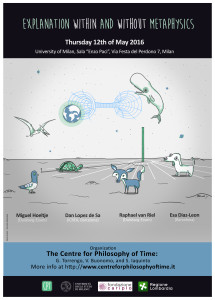Explanation within and without Metaphysics
Thursday 12th of May 2016
University of Milan, Sala “Enzo Paci”, Via Festa del Perdono 7, Milan
—–
Programme
10:00 – 11:30 Miguel Hoeltje (Essen) – “On Two Responses to Missing-explanation-arguments”
11:30 – 11:45 Coffee break
11:45 – 13:15 Dan Lopez de Sa (Barcelona) – TBA
—
13:15 – 14:30 Lunch
—
14:30 – 16:00 Esa Diaz-Leon (Barcelona) – “Grounding and the Explanatory Gap”
16:00 – 16:15 Coffee break
16:15 – 17:45 Raphael van Riel (Essen) – “From Fiction to Truth. How to Be a Realist about Scientific Explanation”
—
Abstracts
Dan Lopez de Sa (Barcelona) – TBA
—
Esa Diaz-Leon (Barcelona) – Grounding and the Explanatory Gap
Abstract: The thesis of physicalism is usually put in terms of physical truths or facts determining, or grounding, all truths or facts. There has been a lot of interest recently in trying to understand the nature of this relation of grounding or metaphysical dependence. According to many authors, grounding is an explanatory relation, that is, the grounds (or explanans) explain what is grounded (or explanandum). For instance, Kit Fine (2012), among others, has argued that if the physical grounds the mental, then this implies that there cannot be an explanatory gap between the physical and the mental. In this paper, I want to argue that the claim that grounding is an explanatory relation, and therefore, grounding is incompatible with an explanatory gap, is unmotivated.
—
Miguel Hoeltje (Essen) – On Two Responses to Missing-explanation-arguments
A response-dependence account of some concept C holds that there is an a priori connection between C’s applying to certain objects and the dispositions of standard subjects to respond in certain ways to these objects. A widely discussed challenge to response-dependence accounts was posed by Mark Johnston’s missing explanation argument (MEA). In this talk, I will introduce a notion that is both closely related to the notion of response-dependence and widely employed in many different areas of philosophy, a notion I will call ‘subject-dependence’. Subject-dependence accounts face a challenge very similar to Johnston’s MEA; hence, proponents of such accounts need a way to mitigate these missing-explanation style worries. My main aim will be to discuss two replies to Johnston’s original MEA (Menzies & Pettit 1993; Bradley 2011) and to evaluate whether these replies are available to proponents of subject-dependence. I will argue for the (modest) claim that these replies are not ‘innocent’ – relying on them requires proponents of subject-dependence to take a stand on substantial and controversial issues concerning what explains what.
—
Raphael van Riel (Essen) – From Fiction to Truth. How to Be a Realist about Scientific Explanation
Abstract: Scientific realism is the view that scientific theories are true, or that the objects and properties scientific theories seem to pick out exist. Anti-realists have argued that since all past theories have been abandoned or turned out to be false at some point, we shouldn’t expect our present and future theories to fare any better. Moreover, it appears that theory choice is underdetermined by data, or available evidence – each theory has many empirically equivalent rivals, as it were. Hence, we should be agnostic about the truth or the metaphysical adequacy of the theories we accept.
Realists have responded in two different ways. Some have tried to block the anti-realist arguments. Others have offered refined versions of realism, versions that are not affected by the anti-realist’s arguments because they relax one or another aspect of realism (say, by replacing talk about “true theories” by talk about “approximately true theories”). In contrast, this paper paves the way for a theory which is compatible with the anti-realist challenges to realism, and, at the same time, preserves what motivated scientific realism in the first place. The main idea is that commitment to true scientific explanations does not presuppose commitment to the truth of the theories used in these explanations. Such a position would be attractive, for it would enable us to combine the strong features of both, realism and anti-realism alike. It would enable us to see how we can be agnostic about the truth or metaphysical adequacy of theories (or talk about unobservables), and, at the same time, maintain that the goal of science is to deliver true explanations, and that science often succeeds in providing such explanations.
The argument rests on a partial analysis of a particular type of explanations, explanations that employ falsehoods in their explanantia in a way that does not affect the truth of the explanation as a whole.
